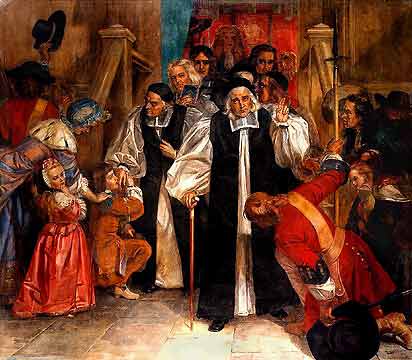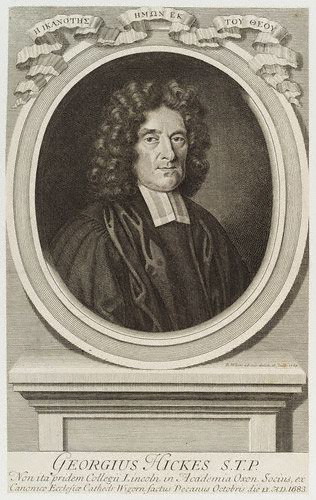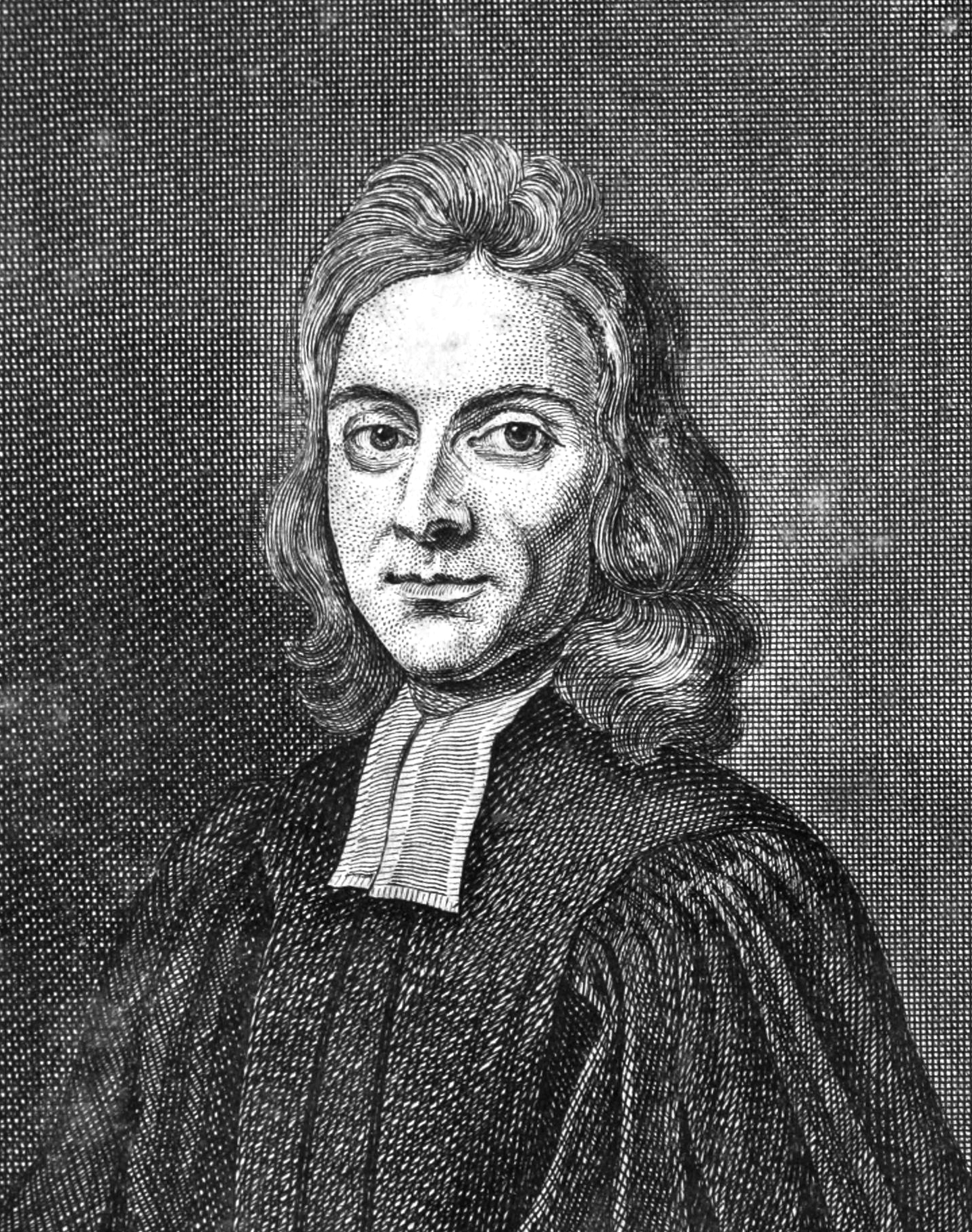|
Robert Nelson (nonjuror)
Robert Nelson (22 June 1656 – 16 January 1715) was an English lay religious writer and nonjuror. Life He was born in London on 22 June 1656, the only surviving son of John Nelson, a merchant in the Turkey trade, by Delicia, daughter of Sir Lewis and sister of Sir Gabriel Roberts, who, like John Nelson, were members of the Levant Company. John Nelson died on 4 September 1657, leaving a good fortune to his son. His mother sent Robert for a time to St Paul's School, but then took him home. She settled at Driffield Gloucestershire, the home of her sister Anne, wife of George Hanger, also a member of the Levant Company. Here George Bull, then rector of Siddington in the neighbourhood, acted as his tutor. He entered Trinity College, Cambridge, as fellow commoner in 1678, but never resided. As early as 1680 he began an affectionate correspondence with John Tillotson, who was a friend of Sir Gabriel Roberts. He was chosen a fellow of the Royal Society on 1 April 1680. He then we ... [...More Info...] [...Related Items...] OR: [Wikipedia] [Google] [Baidu] |
Nonjuring Schism
The Nonjuring schism refers to a split in the State religion, established churches of England, Scotland and Ireland, following the deposition and exile of James II of England, James II and VII in the 1688 Glorious Revolution. As a condition of office, clergy were required to swear allegiance to the ruling monarch; for various reasons, some refused to take the oath to his successors William III of England, William III and II and Mary II of England, Mary II. These individuals were referred to as ''Non-juring'', from the Latin verb ''iūrō'', or ''jūrō'', meaning "to swear an oath". In the Church of England, an estimated 2% of priests refused to swear allegiance in 1689, including nine bishops. Ordinary clergy were allowed to keep their positions but after efforts to compromise failed, the six surviving bishops were removed in 1691. The schismatic Non-Juror Church was formed in 1693 when William Lloyd (bishop of Norwich), Bishop Lloyd appointed his own bishops. His action was opp ... [...More Info...] [...Related Items...] OR: [Wikipedia] [Google] [Baidu] |
Henry Dodwell
Henry Dodwell (October 16417 June 1711) was an Anglo-Irish scholar, theologian and controversial writer. Life Dodwell was born in Dublin in 1641. His father, William Dodwell, who lost his property in Connacht during the Irish rebellion, was married to Elizabeth Slingsby, daughter of Sir Francis Slingsby and settled at York in 1648. Henry received his preliminary education at St Peter's School, York. In 1654 he was sent by his uncle to Trinity College, Dublin, where he became a scholar and fellow, receiving the Bachelor of Arts in 1662 and Master of Arts in 1663. Having conscientious objections to taking religious orders, he relinquished his fellowship in 1666, but in 1688 was elected Camden professor of history at Oxford. In 1691 he was deprived of his professorship for refusing to take the oath of allegiance to William and Mary., endnotes: *''The Works of H. D. ... abridg'd'' with an account of his life, by F Brokesby (2nd ed., 1723) * Thomas Hearne, ''Diaries'' Dodwell ret ... [...More Info...] [...Related Items...] OR: [Wikipedia] [Google] [Baidu] |
George Hickes (divine)
George Hickes (20 June 1642 O.S. – 15 December 1715 O.S.) was an English divine and scholar. Biography Hickes was born at Newsham, near Thirsk, Yorkshire, in 1642. After going to school at Thirsk he went to Northallerton Grammar School in 1652 where he was a classmate of Thomas Rymer. In 1659 he entered St John's College, Oxford, whence after the Restoration he removed to Magdalen College and then to Magdalen Hall. In 1664 he was elected fellow of Lincoln College, and in the following year proceeded M.A. In 1673 he graduated in divinity, and in 1675 he was appointed rector of St Ebbes, Oxford. In 1676, as private chaplain, he accompanied the Duke of Lauderdale, the royal commissioner, to Scotland, and shortly afterwards received the degree of D.D. from St Andrews. In 1680 he became vicar of All Hallows, Barking, London; and after having been made chaplain to the king in 1681, he was in 1683 promoted to the deanery of Worcester. He opposed both James II's declaration of in ... [...More Info...] [...Related Items...] OR: [Wikipedia] [Google] [Baidu] |
Francis Lee (physician)
Francis Lee (12 March 1661 – 23 August 1719) was an English writer and physician, known for his connection with the Philadelphians. Early life Born at Cobham, Surrey on 12 March 1661, he was the fourth son of Edward Lee by his wife Frances. He entered Merchant Taylors' School on 11 September 1675, was admitted a scholar of St John's College, Oxford, on St. Barnabas day, 1679, proceeded B.A. on 9 May 1688, M.A. 19 March 1687, and was elected to a fellowship at St. John's in January 1682. In 1691 Lee became chaplain to John Stawell, 2nd Baron Stawell of Somerton in Somerset, and tutor to his son. He was also tutor to Sir William Dawes. At the Glorious Revolution he was a nonjuror, and failed to proceed B.D. in 1692 as the statutes directed. Lee left England in the summer of 1691. He studied medicine, and on 11 June 1692 entered the university of Leyden, after which he practised medicine in Venice. At this period Lee met Johann Georg Gichtel and Pierre Poiret. Follower of Jan ... [...More Info...] [...Related Items...] OR: [Wikipedia] [Google] [Baidu] |
John Kettlewell
John Kettlewell (10 March 1653 – 12 April 1695) was an English clergyman, nonjuror and devotional writer. He is now known for his arguments against William Sherlock, who had justified the change of monarch of 1688–89 and his own switch of sides in ''The Case of the Allegiance''. According to J. P. Kenyon, Kettlewell's reply made a case "with which conformist Anglicans could only agree, because it was spiritual, while Sherlock's was resolutely aspiritual". He went on to attack defenders of the Glorious Revolution generally as proponents of fallacious contractarian theories. Andrew Pyle (editor), ''Dictionary of Seventeenth Century British Philosophers'' (2000), article on Kettlewell, pp. 487-8. Life He was the second son of John Kettlewell, a merchant at Northallerton, Yorkshire, by his wife, Elizabeth Ogle, was born 10 March 1653, and was educated at Northallerton Grammar School under Thomas Smelt, a royalist, whose other pupils included George Hickes, William Palliser, Th ... [...More Info...] [...Related Items...] OR: [Wikipedia] [Google] [Baidu] |
Blackheath, London
Blackheath is an area in Southeast London, straddling the border of the Royal Borough of Greenwich and the London Borough of Lewisham. It is located northeast of Lewisham, south of Greenwich and southeast of Charing Cross, the traditional centre of London. The area southwest of its station and in its ward is named Lee Park. Its northern neighbourhood of Vanbrugh Park is also known as St John's Blackheath and despite forming a projection has amenities beyond its traditional reach named after the heath. To its west is the core public green area that is the heath and Greenwich Park, in which sit major London tourist attractions including the Greenwich Observatory and the Greenwich Prime Meridian. Blackheath railway station is south of the heath. History Etymology ;Records and meanings The name is from Old English spoken words 'blæc' and 'hǣth'. The name is recorded in 1166 as ''Blachehedfeld'' which means "dark, or black heath field" – field denotes an enclosure or clear ... [...More Info...] [...Related Items...] OR: [Wikipedia] [Google] [Baidu] |
The Hague
The Hague ( ; nl, Den Haag or ) is a city and municipality of the Netherlands, situated on the west coast facing the North Sea. The Hague is the country's administrative centre and its seat of government, and while the official capital of the Netherlands is Amsterdam, The Hague has been described as the country's de facto capital. The Hague is also the capital of the province of South Holland, and the city hosts both the International Court of Justice and the International Criminal Court. With a population of over half a million, it is the third-largest city in the Netherlands, after Amsterdam and Rotterdam. The Hague is the core municipality of the Greater The Hague urban area, which comprises the city itself and its suburban municipalities, containing over 800,000 people, making it the third-largest urban area in the Netherlands, again after the urban areas of Amsterdam and Rotterdam. The Rotterdam–The Hague metropolitan area, with a population of approximately 2.6&n ... [...More Info...] [...Related Items...] OR: [Wikipedia] [Google] [Baidu] |
John Drummond, 1st Earl Of Melfort
John Drummond, 1st Earl of Melfort, styled Duke of Melfort in the Jacobite peerage (8 August 1650 - 25 January 1715), was a Scottish politician and close advisor to James II. A Catholic convert, Melfort and his brother the Earl of Perth consistently urged James not to compromise with his opponents, contributing to his increasing isolation and ultimate deposition in the 1688 Glorious Revolution. In exile, Melfort became the first Jacobite Secretary of State but his unpopularity with other Jacobites led to his resignation in 1694. He served as James' Papal Ambassador in Rome but failed to regain his former influence and retired from active politics. He died in Paris on 25 January 1715. Life John Drummond, later Earl of Melfort, was born in 1649, probably at Stobhall in Perthshire since the family home Drummond Castle was then occupied by the New Model Army. The second son of James Drummond, 3rd Earl of Perth (ca 1615-1675) and Lady Anne Gordon (ca 1621-1656), his elder b ... [...More Info...] [...Related Items...] OR: [Wikipedia] [Google] [Baidu] |
Glorious Revolution
The Glorious Revolution; gd, Rèabhlaid Ghlòrmhor; cy, Chwyldro Gogoneddus , also known as the ''Glorieuze Overtocht'' or ''Glorious Crossing'' in the Netherlands, is the sequence of events leading to the deposition of King James II and VII of England and Scotland in November 1688, and his replacement by his daughter Mary II and her husband and James's nephew William III of Orange, de facto ruler of the Dutch Republic. A term first used by John Hampden (1653–1696), John Hampden in late 1689, it has been notable in the years since for having been described as the last successful invasion of England as well as an internal coup, with differing interpretations from the Dutch and English perspectives respectively. Despite his personal Catholicism, a religion opposed by the Protestant majority in England and Scotland, James became king in February 1685 with widespread support in both countries, since many feared that his exclusion would lead to a repetition of the 16391651 Wa ... [...More Info...] [...Related Items...] OR: [Wikipedia] [Google] [Baidu] |
Aix-la-Chapelle
Aachen ( ; ; Aachen dialect: ''Oche'' ; French and traditional English: Aix-la-Chapelle; or ''Aquisgranum''; nl, Aken ; Polish: Akwizgran) is, with around 249,000 inhabitants, the 13th-largest city in North Rhine-Westphalia, and the 28th-largest city of Germany. It is the westernmost city in Germany, and borders Belgium and the Netherlands to the west, the triborder area. It is located between Maastricht (NL) and Liège (BE) in the west, and Bonn and Cologne in the east. The Wurm River flows through the city, and together with Mönchengladbach, Aachen is the only larger German city in the drainage basin of the Meuse. Aachen is the seat of the City Region Aachen (german: link=yes, Städteregion Aachen). Aachen developed from a Roman settlement and (bath complex), subsequently becoming the preferred medieval Imperial residence of Emperor Charlemagne of the Frankish Empire, and, from 936 to 1531, the place where 31 Holy Roman Emperors were crowned Kings of the Germans. ... [...More Info...] [...Related Items...] OR: [Wikipedia] [Google] [Baidu] |
Transubstantiation
Transubstantiation (Latin: ''transubstantiatio''; Greek: μετουσίωσις ''metousiosis'') is, according to the teaching of the Catholic Church, "the change of the whole substance of bread into the substance of the Body of Christ and of the whole substance of wine into the substance of the Blood of Christ". This change is brought about in the eucharistic prayer through the efficacy of the word of Christ and by the action of the Holy Spirit. However, "the outward characteristics of bread and wine, that is the 'eucharistic species', remain unaltered". In this teaching, the notions of "substance" and "transubstantiation" are not linked with any particular theory of metaphysics. The Roman Catholic Church teaches that, in the Eucharistic offering, bread and wine are changed into the body and blood of Christ. The affirmation of this doctrine was expressed, using the word "transubstantiate", by the Fourth Council of the Lateran in 1215. It was later challenged by various 14th-cen ... [...More Info...] [...Related Items...] OR: [Wikipedia] [Google] [Baidu] |









